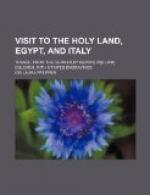Our journey back to Constantinople was not accomplished entirely without mishap. One of the gentlemen fell from his horse and broke his watch. The saddles and bridles of hired horses are here generally in such bad condition that there is every moment something to buckle or to cobble up. We were riding at a pretty round pace, when suddenly the girths burst, and the saddle and rider tumbled off together. I arrived without accident at my destination, although I had frequently been in danger of falling from my horse without its being necessary that the girth should break.
The gentlemen were satisfied with my performance, for I had never lagged behind, nor had they once been detained on my account. It was not until we were safely on board the ship that I told them how venturesome I had been, and what terror I had undergone.
CHAPTER V.
Contradictory reports—Departure from Constantinople
on board the
Archduke John—Scene on the steamer—Galipoli—The
Dardanelles—
Tschenekalesi and Kilidil Bahar—The field
of Troy—Tenedos—Smyrna—
Halizar—The date-palm—Burnaba—The
Acropolis—Female beauty—
Rhodes—Strong fortifications—Deserted
appearance of the town—
Cyprus.
The extremely unfavourable reports I heard from Beyrout and Palestine caused me to defer my departure from day to day. When I applied to my consul for a “firmann” (Turkish passport), I was strongly advised not to travel to the Holy Land. The disturbances on Mount Lebanon and the plague were, they assured me, enemies too powerful to be encountered except in cases of the most urgent necessity.
A priest who had arrived from Beyrout about two months previously affirmed positively that, in consequence of the serious disturbances, even he, known though he was far and wide as a physician, had not dared to venture more than a mile from the town without exposing himself to the greatest danger. He advised me to stay in Constantinople until the end of September, and then to travel to Jerusalem with the Greek caravan. This, he said, was the only method to reach that city in safety.
One day I met a pilgrim in a church who came from Palestine. On my asking his advice, he not only confirmed the priest’s report, but even added that one of his companions had been murdered whilst journeying homeward, and that he himself had been despoiled of his goods, and had only escaped death through the special interposition of Providence. I did not at all believe the asseverations of this man; he related all his adventures with such a Baron Munchausen air, assumed probably to excite admiration. I continued my investigations on this subject until I was at length fortunate enough to find some one who told an entirely different tale. From this I felt assured at least of the fact, that it would be almost impossible to learn the true state of the case here in Constantinople, and at length made up my mind to avail myself of the earliest opportunity of proceeding as far as Beyrout, where there was a chance of my getting at the truth.




